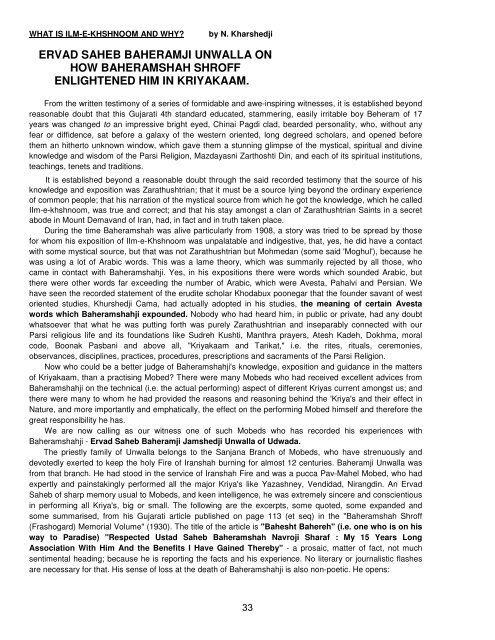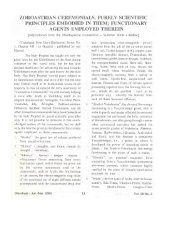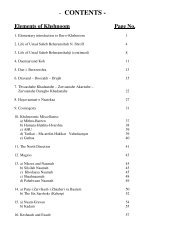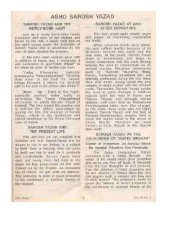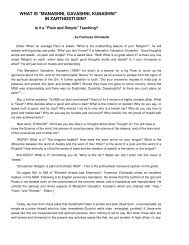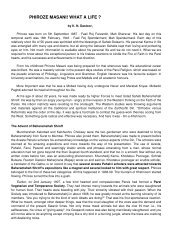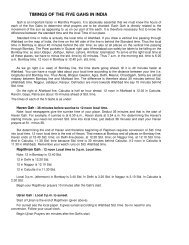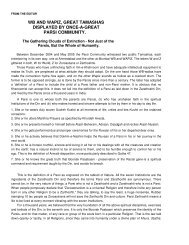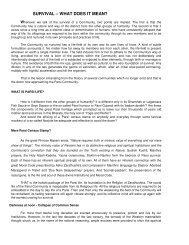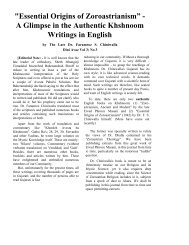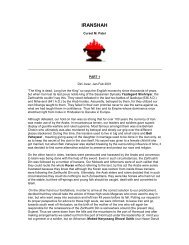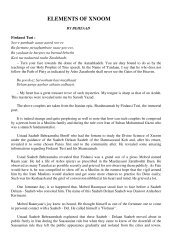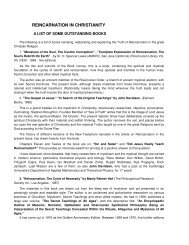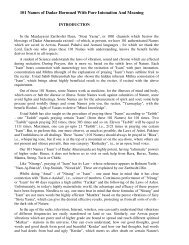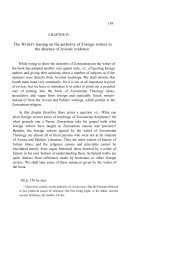Ilm-e-Khshnoom - Traditional Zoroastrianism: Tenets of the Religion
Ilm-e-Khshnoom - Traditional Zoroastrianism: Tenets of the Religion
Ilm-e-Khshnoom - Traditional Zoroastrianism: Tenets of the Religion
Create successful ePaper yourself
Turn your PDF publications into a flip-book with our unique Google optimized e-Paper software.
WHAT IS ILM-E-KHSHNOOM AND WHY? by N. Kharshedji<br />
ERVAD SAHEB BAHERAMJI UNWALLA ON<br />
HOW BAHERAMSHAH SHROFF<br />
ENLIGHTENED HIM IN KRIYAKAAM.<br />
From <strong>the</strong> written testimony <strong>of</strong> a series <strong>of</strong> formidable and awe-inspiring witnesses, it is established beyond<br />
reasonable doubt that this Gujarati 4th standard educated, stammering, easily irritable boy Beheram <strong>of</strong> 17<br />
years was changed to an impressive bright eyed, Chinai Pagdi clad, bearded personality, who, without any<br />
fear or diffidence, sat before a galaxy <strong>of</strong> <strong>the</strong> western oriented, long degreed scholars, and opened before<br />
<strong>the</strong>m an hi<strong>the</strong>rto unknown window, which gave <strong>the</strong>m a stunning glimpse <strong>of</strong> <strong>the</strong> mystical, spiritual and divine<br />
knowledge and wisdom <strong>of</strong> <strong>the</strong> Parsi <strong>Religion</strong>, Mazdayasni Zarthoshti Din, and each <strong>of</strong> its spiritual institutions,<br />
teachings, tenets and traditions.<br />
It is established beyond a reasonable doubt through <strong>the</strong> said recorded testimony that <strong>the</strong> source <strong>of</strong> his<br />
knowledge and exposition was Zarathushtrian; that it must be a source lying beyond <strong>the</strong> ordinary experience<br />
<strong>of</strong> common people; that his narration <strong>of</strong> <strong>the</strong> mystical source from which he got <strong>the</strong> knowledge, which he called<br />
IIm-e-khshnoom, was true and correct; and that his stay amongst a clan <strong>of</strong> Zarathushtrian Saints in a secret<br />
abode in Mount Demavand <strong>of</strong> Iran, had, in fact and in truth taken place.<br />
During <strong>the</strong> time Baheramshah was alive particularly from 1908, a story was tried to be spread by those<br />
for whom his exposition <strong>of</strong> IIm-e-<strong>Khshnoom</strong> was unpalatable and indigestive, that, yes, he did have a contact<br />
with some mystical source, but that was not Zarathushtrian but Mohmedan (some said 'Moghul'), because he<br />
was using a lot <strong>of</strong> Arabic words. This was a lame <strong>the</strong>ory, which was summarily rejected by all those, who<br />
came in contact with Baheramshahji. Yes, in his expositions <strong>the</strong>re were words which sounded Arabic, but<br />
<strong>the</strong>re were o<strong>the</strong>r words far exceeding <strong>the</strong> number <strong>of</strong> Arabic, which were Avesta, Pahalvi and Persian. We<br />
have seen <strong>the</strong> recorded statement <strong>of</strong> <strong>the</strong> erudite scholar Khodabux poonegar that <strong>the</strong> founder savant <strong>of</strong> west<br />
oriented studies, Khurshedji Cama, had actually adopted in his studies, <strong>the</strong> meaning <strong>of</strong> certain Avesta<br />
words which Baheramshahji expounded. Nobody who had heard him, in public or private, had any doubt<br />
whatsoever that what he was putting forth was purely Zarathushtrian and inseparably connected with our<br />
Parsi religious life and its foundations like Sudreh Kushti, Manthra prayers, Atesh Kadeh, Dokhma, moral<br />
code, Boonak Pasbani and above all, "Kriyakaam and Tarikat," i.e. <strong>the</strong> rites, rituals, ceremonies,<br />
observances, disciplines, practices, procedures, prescriptions and sacraments <strong>of</strong> <strong>the</strong> Parsi <strong>Religion</strong>.<br />
Now who could be a better judge <strong>of</strong> Baheramshahji's knowledge, exposition and guidance in <strong>the</strong> matters<br />
<strong>of</strong> Kriyakaam, than a practising Mobed? There were many Mobeds who had received excellent advices from<br />
Baheramshahji on <strong>the</strong> technical (i.e. <strong>the</strong> actual performing) aspect <strong>of</strong> different Kriyas current amongst us; and<br />
<strong>the</strong>re were many to whom he had provided <strong>the</strong> reasons and reasoning behind <strong>the</strong> 'Kriya's and <strong>the</strong>ir effect in<br />
Nature, and more importantly and emphatically, <strong>the</strong> effect on <strong>the</strong> performing Mobed himself and <strong>the</strong>refore <strong>the</strong><br />
great responsibility he has.<br />
We are now calling as our witness one <strong>of</strong> such Mobeds who has recorded his experiences with<br />
Baheramshahji - Ervad Saheb Baheramji Jamshedji Unwalla <strong>of</strong> Udwada.<br />
The priestly family <strong>of</strong> Unwalla belongs to <strong>the</strong> Sanjana Branch <strong>of</strong> Mobeds, who have strenuously and<br />
devotedly exerted to keep <strong>the</strong> holy Fire <strong>of</strong> Iranshah burning for almost 12 centuries. Baheramji Unwalla was<br />
from that branch. He had stood in <strong>the</strong> service <strong>of</strong> Iranshah Fire and was a pucca Pav-Mahel Mobed, who had<br />
expertly and painstakingly performed all <strong>the</strong> major Kriya's like Yazashney, Vendidad, Nirangdin. An Ervad<br />
Saheb <strong>of</strong> sharp memory usual to Mobeds, and keen intelligence, he was extremely sincere and conscientious<br />
in performing all Kriya's, big or small. The following are <strong>the</strong> excerpts, some quoted, some expanded and<br />
some summarised, from his Gujarati article published on page 113 (et seq) in <strong>the</strong> "Baheramshah Shr<strong>of</strong>f<br />
(Frashogard) Memorial Volume" (1930). The title <strong>of</strong> <strong>the</strong> article is "Bahesht Bahereh" (i.e. one who is on his<br />
way to Paradise) "Respected Ustad Saheb Baheramshah Navroji Sharaf : My 15 Years Long<br />
Association With Him And <strong>the</strong> Benefits I Have Gained Thereby" - a prosaic, matter <strong>of</strong> fact, not much<br />
sentimental heading; because he is reporting <strong>the</strong> facts and his experience. No literary or journalistic flashes<br />
are necessary for that. His sense <strong>of</strong> loss at <strong>the</strong> death <strong>of</strong> Baheramshahji is also non-poetic. He opens:<br />
33


